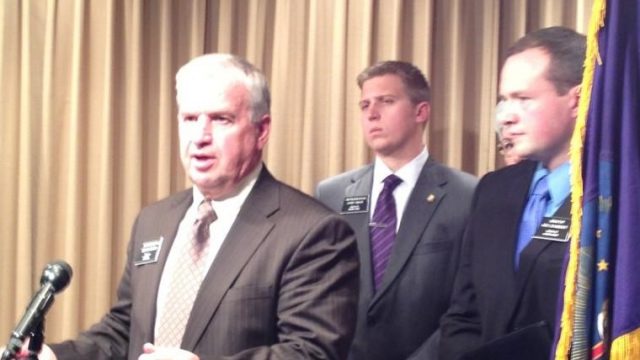Every Single Democrat Ethics And Transparency Proposal Got A "Do Not Pass" Recommendation Yesterday

corey mock, mac schneider, jerry klein
At the beginning of the legislative session Democrats introduced a raft of transparency and ethics laws. Some of what Democrats are proposing are very, very bad ideas that would do to facilitate partisan bickering, and hinder free speech, than promote ethics or transparency.
HB1444, introduced by Rep. Gail Mooney, would require anyone proposing model legislation to a legislator register as a lobbyist. Which means that if you, as a citizen, take some policy promoted by a group like the NRA or Planned Parenthood to a legislator, asking them to introduce it, you have to register as a lobbyist. This b
HB1430, introduced by Rep. Ed Gruchalla, would require that corporations report their independent spending to the Secretary of State, and the bill would also require that independent political groups advocating for or against candidates disclose not only their contributors but who their contributors work for. The bill does exempt “any position taken in any bona fide news story, commentary, or editorial,” but that might not include private citizens running blogs (gulp).
HB1442, introduced by Rep. Corey Mock, would create a statewide ethics panel which “may investigate a complaint alleging that any member of the legislative assembly, elected or appointed executive branch officer, judge of the district court, supreme court justice, candidate for elective legislative, executive, or judicial office, lobbyist, or state employee.” That may sound good, in theory, but in reality this will be an instrument for partisan recriminations and fishing trips.
All three of these ill-advised bills received a 10-3 “do not pass” recommendation from the House Government and Veterans Affairs Committee, and I suspect they’re on their way to getting defeated on the House floor. That’s as it should be.
But three bills coming from the Democrats that aren’t such bad ideas got panned by House, and Senate, committees too.
HB1436, HB1449 and SB2276 would expand reporting requirements for candidates for elected office. They would mean more information about how campaigns are funded available for public scrutiny. The House bills also got a 10-3 “do not pass” recommendation from the House Government Affairs committee, and the Senate bill got a 5-2 recommendation from the Senate version of that committee.
That’s unfortunate.
I suspect that Democrats submitted these bills as a part of a long-term agenda to prove that the Republican-dominated state is mired in corruption. They can use the failure of these bills as evidence of that. Republicans can weaken their case by passing some of these bills.
That some of these bills also happen to be good policy that will promote government transparency shouldn’t be ignored either.







